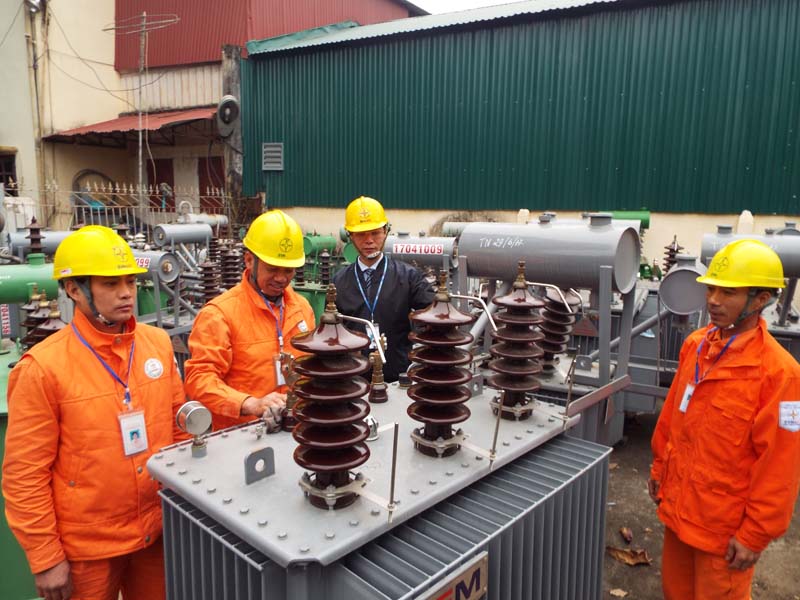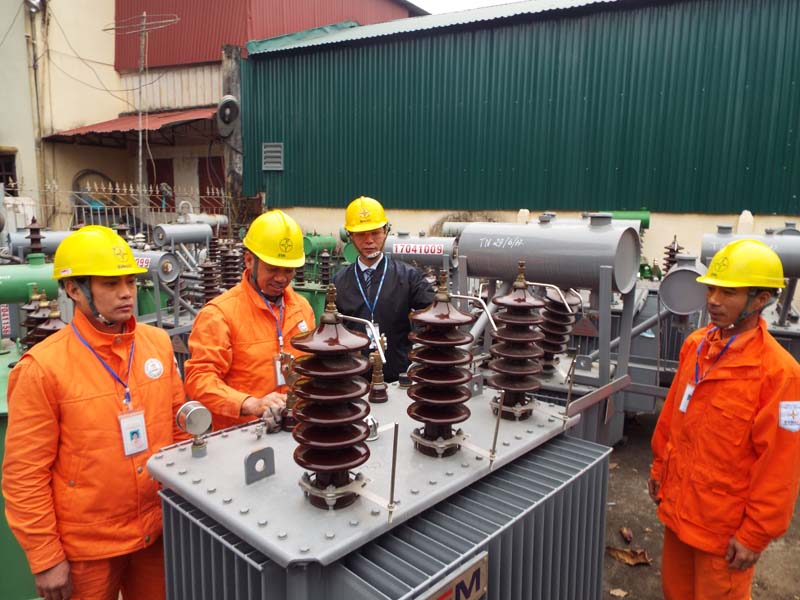
(HBO) - The Hoa Binh Power Company is implementing specific plans to respond to natural disasters and floods under the direction by the Electricity of Vietnam Group (EVNSPC)’s Northern Power Corporation under the motto of "four on-site duties”

Staff of the province’s electricity sector
inspecting the backup material plan to ensure supply in the rainy season in
2018.
Electricity industry is a specific economic sector in Hoa Binh. It is prone natural disasters. The disaster
prevention, search and rescue work is
considered as a key task of the Hoa Binh Power Company.
The firm has rolled out a disaster response scheme at
an early date, which was approved by the Northern Power Corporation. On the basis of the scheme, the firm’s branches were
assigned to swiftly solve incidents, thus ensuring safe power re-supply to
local residents.
The company has planned for the disaster
prevention, search and rescue work and assigned
its branches with specific works. It has also prepared backup equipment in
areas that enable replacement. For large-sized equipment, the company signed contracts
of equipment supply with capable units.
The power supply modes were also detailed,
including the basic and circular power supply ones, to ensure no power
interruption on the large scale.
Units have set up task force for
overcoming disaster consequences. Scenarios and plans to respond to natural disasters
are very close to the reality.
The Hoa Binh Power Company has actively inspected and reinforced infrastructure
facilities after disasters, helping minimize the damage.
Thanks to the careful preparations, the firm effectively overcame consequences caused
by floods for the electricity industry in 2017, especially for infrastructure
systems and power work.
Additionally, the company has also focused on implementing plans for setting up resettlement areas in areas vulnerable to natural
disasters. The firm has coordinated
with other localities’ authorities to build disaster prevention
schemes and detailed electricity supply plans so as to be able to supply
electricity as soon as possible after incidents./.
According to data from the Hoa Binh Provincial Party Committee, the industrial production index for the first six months of 2025 is estimated to have increased by 20% compared to the same period last year. This marks the highest year-on-year growth rate for this period since 2020.
In the first six months of 2025, Hoa Binh province’s export turnover was estimated at 1.145 billion USD, marking an 18.11% increase compared to the same period in 2024. Import turnover was estimated at $ 804 million, a 17.15% increase, which helped the province maintain a positive trade balance.
The lives of the ethnic minority farmers in Tan Lac district have gradually improved thanks to the new directions in agricultural production. This is a testament to the collective strength fostered through the professional associations and groups implemented by various levels of the district’s Farmers’ Union.
With the motto the "product quality comes first,” after nearly one year of establishment and operation, Muong village’s Clean Food Agricultural and Commercial Cooperative, located in Cau Hamlet, Hung Son Commune (Kim Boi district), has launched reputable, high-quality agricultural products to the market that are well-received by consumers. The products such as Muong village’s pork sausage, salt-cured chicken, and salt-cured pork hocks have gradually carved out a place in the market and they are on the path to obtaining the OCOP certification.
In the past, the phrase "bumper harvest, rock-bottom prices" was a familiar refrain for Vietnamese farmers engaged in fragmented, small-scale agriculture. But today, a new spirit is emerging across rural areas of Hoa Binh province - one of collaboration, organisation, and collective economic models that provide a stable foundation for production.
Maintaining growing area codes and packing facility codes in accordance with regulations is a mandatory requirement for agricultural products to be eligible for export. Recently, the Department of Agriculture and Environment of Hoa Binh province has intensified technical supervision of designated farming areas and packing facilities to safeguard the "green passport" that enables its products to access international markets.



